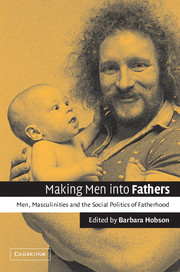Book contents
- Frontmatter
- Contents
- List of figures
- List of tables
- Preface
- Introduction: making men into fathers
- Part 1 Who fathers?
- Part 2 Men in social policy and the logics of cash and care
- 2 Citizens, workers or fathers? Men in the history of US social policy
- 3 Compulsory fatherhood: the coding of fatherhood in the Swedish welfare state
- 4 The problem of fathers: policy and behavior in Britain
- 5 A new role for fathers? The German case
- 6 Transformations of fatherhood: the Netherlands
- Part 3 Resisting and reclaiming fatherhood
- Part 4 Theorizing men, masculinities and fatherhood
- Notes
- References
- Index
6 - Transformations of fatherhood: the Netherlands
Published online by Cambridge University Press: 22 September 2009
- Frontmatter
- Contents
- List of figures
- List of tables
- Preface
- Introduction: making men into fathers
- Part 1 Who fathers?
- Part 2 Men in social policy and the logics of cash and care
- 2 Citizens, workers or fathers? Men in the history of US social policy
- 3 Compulsory fatherhood: the coding of fatherhood in the Swedish welfare state
- 4 The problem of fathers: policy and behavior in Britain
- 5 A new role for fathers? The German case
- 6 Transformations of fatherhood: the Netherlands
- Part 3 Resisting and reclaiming fatherhood
- Part 4 Theorizing men, masculinities and fatherhood
- Notes
- References
- Index
Summary
Introduction
Fatherhood has taken center stage in the Netherlands. One finds a new emphasis on a father's role as carer, not just as provider, articulated in public discourse, law and social policy. This shift can be illustrated by three striking examples privileging fathers, which reveal the importance of the caring role of fathers. First, the most visible is a media campaign launched by the government to persuade fathers to become more involved in the upbringing and raising of their children. Take, for instance, a television spot, initiated by the Ministry of Social Affairs (and Emancipation) which shows an old-fashioned family with haircuts and clothes reminiscent of the 1950s. The intention of this depiction is probably to remind us of the traditional family form of that period, one which we are all familiar with. The picture shows the following scene:
A father, two daughters and a son are sitting around the table in the dining room. No one says a word. Suddenly, a woman, obviously the mother, enters the room and offers a plate with meat to the father who cuts the meat. At that moment, a voice representing the thought of the son, says, “who is this man who cuts the meat every Sunday?” Then, a written text appears: “Men are as indispensable at home as they are at work.”
The campaign highlights the care responsibilities of men from a relational perspective.
- Type
- Chapter
- Information
- Making Men into FathersMen, Masculinities and the Social Politics of Fatherhood, pp. 168 - 188Publisher: Cambridge University PressPrint publication year: 2002
- 13
- Cited by



